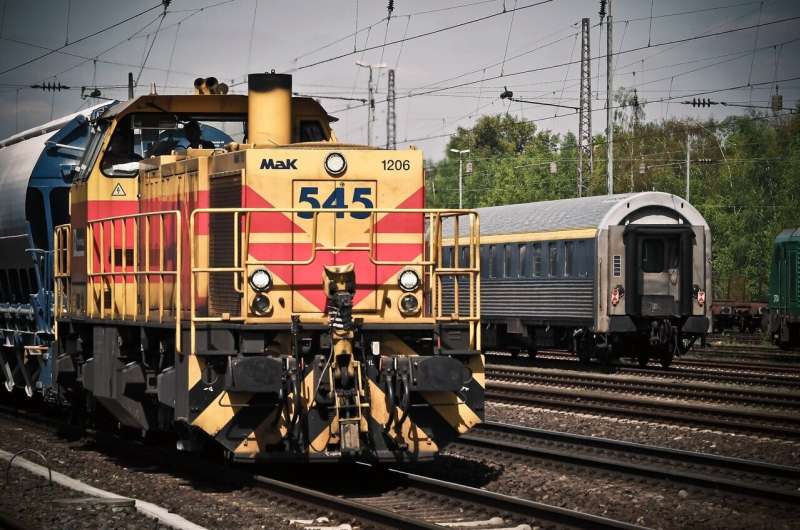
December 19, 2024 by Judith Kohler
Collected at: https://techxplore.com/news/2024-12-startup-aims-rails-power-lines.html
Freight trains criss-crossing the country carry cars of coal and tanks of oil and natural gas to power plants to help keep the nation’s electric grid going. Could freight trains haul electrons generated by renewable energy sources for the same purpose?
That was a question that Christopher Smith, who has an extensive background in the renewable energy industry, asked himself. He was hiking in Alaska, watching a train roll by, when he had what he called an epiphany: freight trains, in fact, could play a vital role in getting renewable power from the remote places where it is often produced to where the electricity is needed.
About four years later, Smith and Jeff Anderson, a green-tech entrepreneur, are pursuing what they say will be a first-in-the-nation pilot project in Colorado. They want to show that trains can be used to get around transmission bottlenecks by hauling large batteries to sites, such as existing coal or natural gas plants, where the stored power can be distributed to the electric grid.
Their company, San Francisco-based SunTrain, is joining Xcel Energy, Colorado’s largest electric utility, and the National Renewable Energy Laboratory in Golden, to apply for a $10 million federal grant to further the technology. If the technology is successful and state regulators give their approval, the pilot project could be developed in two years and the first train could be operating in the field in four years, said Anderson, SunTrain CEO.
Anderson and Smith, SunTrain’s president and chief technology officer, said a lack of transmission capacity on the grid is hampering the deployment of power from renewable sources and efforts to transition from fossil fuels.
Several studies forecast a need to significantly expand the nation’s transmission system, including a recent report by the U.S. Department of Energy, in partnership with NREL and the Pacific Northwest National Laboratory, said the system will need to at least double in size by 2050.
“Right now, a majority of green energy projects are built around transmission access. All the low-hanging fruit around transmission line access has been gobbled up over the last 20 years,” Smith said.
Some projects that Smith worked on with the International Brotherhood of Electrical Workers over the past few years fell by the wayside because of lack of access to the grid.
“That led me to start thinking if there was another way to start bringing electrons to market. Is there another delivery method to bring electrons to load centers and consumers?”
The U.S. freight train system covers roughly 140,000 miles and much of that is in sweeping, remote swaths of land where wind farms and large solar arrays are typically located, Smith said.
Another advantage is that trains and railways are built to handle heavy loads that would be too much for trucks. The lithium-iron-phosphate batteries SunTrain is using weigh 120 tons each. The company said the train carrying the high-capacity batteries would likely run from 80 to 100 cars.
Smith said the batteries contain less than 6% lithium, compared with 60% in batteries with different chemistry makeups. If a train derails, “we’re going to have a lot of twisted metal: not an explosion, not a fire, not an environmental hazard,” he added.
According to SunTrain, railway companies are open to the idea of becoming conveyors of power from renewable energy sources. Smith said hauling fossil fuels has long been a big source of their revenue, but is making up an increasingly smaller portion of their loads.
Members of the IBEW and the National Electrical Contractor’s Association were on hand for a news conference by SunTrain on Dec. 4 in Denver to show support for the company’s pilot project, called the Wireless Alternative by Train Transport, or WATT. So was Gov. Jared Polis, who wrote a letter to federal agencies in support of SunTrain’s grant application.
“This provides an immediate, alternative connection between renewable energy generation and load, bypassing the congested transmission system,” Polis said in the Oct. 20 letter. “Importantly, it also supports an economic transition for workers and communities by replacing lost coal transport business with battery freight cars and repurposing retiring fossil fuel power plants as charge/discharge points.”
Anderson of SunTrain said Xcel Energy’s Cherokee Generating Station in Denver is a possible site where the company could reduce the use of natural gas for electricity. The company estimates the pilot project will cost about $125 million. Smith said SunTrain is raising money for the work, including from venture funds.
“If the grant doesn’t come through, then we get more creative and raise more money,” Anderson said.

Leave a Reply